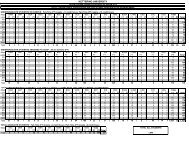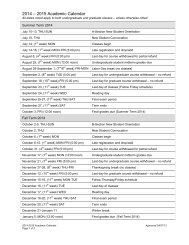2006-2007 Undergraduate Catalog - Kettering University
2006-2007 Undergraduate Catalog - Kettering University
2006-2007 Undergraduate Catalog - Kettering University
You also want an ePaper? Increase the reach of your titles
YUMPU automatically turns print PDFs into web optimized ePapers that Google loves.
Copyright & Disclaimer Information: Copyright © 1994, 1995, 1996, 1997, 1998, 1999, 2000, 2001, 2002, 2003, 2004, 2005, <strong>2006</strong>, <strong>2007</strong>. CollegeSource®, Inc. and Career Guidance Foundation. CollegeSource® digital catalogs are derivative works owned and copyrighted by CollegeSource®, Inc. and Career Guidance Foundation. <strong>Catalog</strong> content is owned and copyrighted by the appropriate school. While CollegeSource®, Inc. and Career Guidance Foundation provides information as a service to the public, copyright is retained on all digital catalogs.<br />
Copyright & Disclaimer Information: Copyright © 1994, 1995, 1996, 1997, 1998, 1999, 2000, 2001, 2002, 2003, 2004, 2005, <strong>2006</strong>, <strong>2007</strong>. CollegeSource®, Inc. and Career Guidance Foundation. CollegeSource® digital catalogs are derivative works owned and copyrighted by CollegeSource®, Inc. and Career Guidance Foundation. <strong>Catalog</strong> content is owned and copyrighted by the appropriate school. While CollegeSource®, Inc. and Career Guidance Foundation provides information as a service to the public, copyright is retained on all digital catalogs.<br />
62 / <strong>Kettering</strong> <strong>University</strong><br />
COMPUTER ENGINEERING MINOR<br />
A student must complete a minimum of 36 credits as outlined below to earn a minor in Computer Engineering.<br />
Required Courses<br />
All of the following courses are required to obtain a Computer Engineering Minor:<br />
CE-210 Digital Systems<br />
CE-320 Microcomputers I<br />
CS-101 Computing and Algorithms I<br />
CS-102 Computing and Algorithms II<br />
EE-210 Circuits I<br />
EE-211 Circuits I Lab<br />
EE-320 Electronics I<br />
EE-321 Electronics I Lab<br />
Elective Courses<br />
One of the following must be chosen:<br />
CE-310 Digital Systems II<br />
CE-422 Computer Architecture and Organization<br />
and one of the following must be chosen:<br />
CE-420 Microcomputers II<br />
CE-426 Real-Time Embedded Computers<br />
and one of the following must be chosen:<br />
CE-436 Data Acquisition and Databases<br />
CE-480 Computer Networks<br />
CS-451 Operating Systems I<br />
ELECTRICAL ENGINEERING OVERVIEW<br />
Electrical Engineering is a broad engineering discipline which integrates mathematical and scientific principles of electricity and magnetism<br />
to analyze electrical phenomena and to design electrical systems. The Electrical Engineering program prepares students for a wide-range of<br />
careers involving design and implementation of electrical systems.<br />
In the Electrical Engineering program, students first take five fundamental courses in electrical circuits, electronics, electrical signals and<br />
systems, and electromagnetic effects before choosing elective courses of interest or specialize in a specific area of electrical engineering.<br />
These specialization areas include electronics, communication systems, control systems, and power systems. The program requires students<br />
to complete a senior level design course which provides students experience in integrating and applying many engineering concepts and<br />
designing innovative systems.<br />
Our courses are supported by modern lab facilities in analog and digital electronics, automotive electronics, control systems, high-voltage<br />
measurements, semiconductor devices and very large scale integrated (VLSI) systems.<br />
PROGRAM EDUCATIONAL OBJECTIVES<br />
The Electrical Engineering program is designed to provide its graduates a solid educational foundation on which they can build successful<br />
and sustainable careers in electrical engineering or a related field. In particular, all graduates of the Electrical Engineering program will<br />
have:<br />
• an ability to analyze and design basic electrical, electronic and digital systems<br />
• the necessary interpersonal and communication skills to be productive members in a team work environment<br />
• an insight into contemporary issues and their implications to engineering practice<br />
• the skills, confidence and experience to enable them to assume positions of technical and/or managerial leadership in<br />
their career paths<br />
• an awareness of ethical and professional responsibilities<br />
• a strong background and motivation to pursue life-long learning.
















